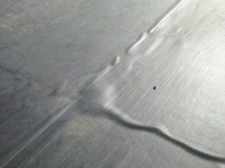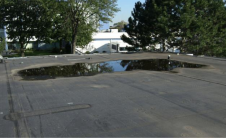Most commercial buildings have flat roofs made up of a variety of different types of roofing materials. Here’s how to know if your flat roof simply needs minor repairs or if it’s time for a full replacement.
Most commercial roofs less than 10 years old should only need repairs especially if damage or wear and tear is isolated to a specific area and are minor issues that can be repaired quickly and efficiently. Common deficiencies in commercial roofs that can easily be repaired include:
• Minor tears/punctures
• Nails that have popped out of place
• Worn out flashings
• Deteriorated sealants and caulking
• Rusted fasteners
• Minor damage to coping caps
• Clogged gutters and drains
All of the above common repairs can quickly be addressed and prevented with a preventative roof maintenance program where each quarter, six months or year a dedicated roofing service team will inspect your roof to make minor repairs, clean gutters and downspouts and remove debris from the roof’s surface. All of this will prolong the life of your roofing system.
However, most properly installed flat roofs should last between 20-25 years, so if you are getting to that timeframe and are noticing that repairs are becoming more frequent, extensive and are no longer isolated to a specific area, it’s likely time to replace your roof. Here’s some other common signs to watch out for:
Blistering, Bubbles and Cracking – Blisters, bubbles and cracks on the surface of the roof membrane are sure signs that it’s time to replace the membrane.

Ponding Water – “Flat” roofs usually have at least a 15-degree slope to allow for water runoff, but as the roof ages, the roof could start to warp causing the designed runoff to become less effective and water to pool and puddle leading to increased water damage and leaks.

Persistent Roof Leaks – As roofing materials age and break down from exposure to sunlight and weather, cracks will form causing roof leaks to become more persistent as water makes its way through the cracks. Discoloration, mold and mildew on the interior ceilings are all signs of ongoing roof leaks.
Increasing Energy Bills – If your energy bill is rising and you are having trouble pinpointing the source, it could be your roof! High-quality TPO, PVC and EPDM flat roofing membranes are designed to conserve energy. As the roof ages, it will eventually fail to property insulate the structure its connected to.
A new roof system provides the following benefits:
• Energy Savings – most roofing systems today help deflect heat away from the building which saves on ongoing energy costs and depending on the type of roof selected and if new insulation is installed, a building owner could earn a hefty rebate from their energy company after the installation
• Weatherproofing – new roofs are better at resisting strong storms, including hail and strong winds
• Leak Protection – with a new commercial roof and an ongoing roof maintenance plan, your business will have the best leak protection

Kristen Botts co-founded the program with her husband, Nathan Botts, who is a Veteran himself. Photos provided by Kristen Botts.An organization helping Veterans live a full life after their service in the U.S. Military wants to connect Veterans and d

Patrick NoblesHuntington Bancshares Incorporated announced on Feb. 2 that it has closed its merger with Cadence Bank, a regional bank headquartered in Houston, Texas and Tupelo, Miss. This strategic partnership accelerates Huntington’s growth in

There is extensive dialogue surrounding Fayetteville as a travel destination or city aimed at recruiting new businesses and new residents. As someone who moved here from out of state, I thought it could be fun to share my personal experience as